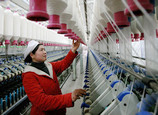
Regrettably, the adoption of pro-growth macroeconomic policies in the context of the national economic deceleration last year, including two cuts in benchmark interest rates and banks' reserve requirement ratio, moves that sent the market an unequivocal message of monetary easing, has given the struggling housing market a chance for respite and the opportunity to rebound.
The vows made by China's new leaders to promote urbanization have further boosted the impulse of developers to acquire bigger profits through raising housing prices, but they are defying the government's explicit stance that the country will pursue a higher quality of urbanization. With people expecting housing prices to continue rising, the phenomenon of panic home-buying has again emerged in some big cities, although relevant State departments have time and again tried to ease people's concerns over supply insufficiencies and vowed to maintain tightened housing regulations.
Recent media reports about the yuan's over-issuance (China's M2 supply is approaching 100 trillion yuan, which is 180 percent of its gross domestic product), has also aggravated people's concerns about inflation in the future, driving some potential homebuyers into the market ahead of time as a way of fending off inflation and preserving the value of personal assets. Investors and speculators will not easily let slip any chance of profiteering.
Public expectations of further price rises, together with tighter housing supply, as the result of a decline in housing inventory and the area of new homes constructed, will pose a big challenge to the government if no targeted regulatory measures are taken.
Statistics show that the area of new homes built in Beijing was down 24.1 percent year-on-year in 2012 and down 26.9 percent year-on-year in Shanghai. Recent media reports of the multiple properties possessed by some local officials across the country have disclosed a broad picture of the unfair distribution of the country's limited housing resources and aggravated public anger at the inability of the government to make the market accessible to more people.
The latest round of housing price rises has come despite the government's unrelenting efforts to curb them, and, if unchecked, the rising prices will seriously erode its authority and credibility. It is also against ongoing government efforts to extricate the national economy from real estate-dominant investment and its reiterated commitment to pursue a higher quality of urbanization and improve people's livelihoods.


















 Most feared Spring Festival questions
Most feared Spring Festival questions


![]()
